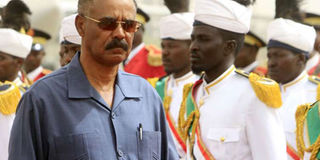Eritrea accuses arch- rival Ethiopia of attack

Eritrean President Isaias Afwerki (left) inspects the guard of honour during his welcome ceremony in the Sudanese capital, Khartoum, on June 11, 2015. Eritrea on Monday accused Ethiopia of attacking its heavily militarised border. PHOTO | AFP
What you need to know:
- Ethiopia on Sunday “unleashed an attack against Eritrea on the Tsorona Central Front.”
- Eritrea won independence from Ethiopia in 1991 after three decades of war, but returned to battle in 1998-2000.
- Eritrea and Ethiopia have long traded accusations of attacks and of backing rebels to needle each other.
ASMARA
Eritrea on Monday accused arch-rival Ethiopia of attacking its heavily militarised border, but officials in Addis Ababa said they had no knowledge of the reported fighting.
Ethiopia on Sunday “unleashed an attack against Eritrea on the Tsorona Central Front,” Eritrea’s ministry of information said in a statement.
Ethiopian government spokesman Getachew Redda said there were “no clashes that we know of”.
Eritrea won independence from Ethiopia in 1991 after three decades of war, but returned to battle in 1998-2000.
They remain bitter enemies, with their troops still eyeing each other along the fortified frontier. Tensions are never far from the surface.
“The purpose and ramifications of this attack are not clear,” Eritrea said, adding it “will issue further statements on the unfolding situation.”
Eritrea and Ethiopia have long traded accusations of attacks and of backing rebels to needle each other.
In March 2012, Ethiopia attacked an Eritrean military base, accusing the country of supporting “terrorist activities” on its territory. In February, Ethiopia accused Eritrea of being behind anti-government protests in the Oromia region last year which led to a violent clampdown by the government in Addis Ababa.
The two countries remain at odds over the flashpoint town of Badme, awarded to Eritrea by a United Nations-backed boundary commission but still controlled by Ethiopia.
It was not immediately possible to verify the reports of clashes independently. Eritrea’s media is ranked below North Korea as worst in the world for press freedom by Reporters Without Borders.
CLASHES REPORTED
However, opposition Eritrean websites, run from abroad but with contacts inside the country, reported there were clashes along the border, but said they had no indication if there had been casualties.
“Yet another Eritrea-Ethiopia military clash,” the Awate.com website reported, while noting that it is rare for Eritrea to directly accuse Ethiopia of military attacks. “The clash occurred shortly after midnight on Sunday morning and each side appears to be calling up reinforcement,” Awate said. The Asmarino website carried a statement from opposition campaigners appealing for calm.
“The prospect of another war is inconceivable,” the statement read.
Thousands of Eritreans risk their lives to flee the hardline regime every month according to the UN, fleeing across the border into Sudan and Ethiopia despite a shoot-to-kill policy along the frontier.
Those who escape describe crawling under razor wire, tiptoeing across minefields or sneaking past armed border guards in their bid for freedom.
Last week the United Nations Commission of Inquiry on human rights said the government of President Isaias Afwerki, in power since 1991, was guilty of systematic enslavement, forcible conscription and other abuses.
Eritrea rejected the findings as “laughable.”




